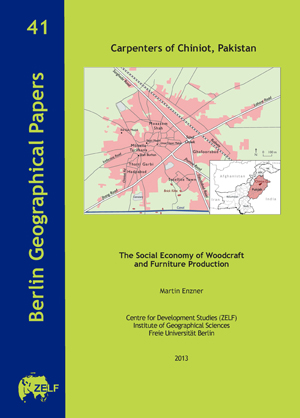
Zitationsvorschlag
Veröffentlicht
Downloads
Carpenters of Chiniot, Pakistan
The Social Economy of Woodcraft and Furniture Production
The combination of the artisanal heritage, the existence of a contemporary large-scaled carpentry and woodcraft cluster and the phenomenon of carpentry being the prevalent occupation in the city, makes Chiniot an interesting case for an historical comparison of the socio-economic conditions of carpenters in society. Additionally, the topic of caste in a Muslim country like Pakistan is deserving of attention. The basic research questions underlying this paper are:
• Which economic processes influenced the carpenters’ lives during the British period?
• How was the socio-economic condition of Chinioti (respectively Punjabi) carpenters
constituted in the past, with emphasis on their caste identity during the British colonial period?
• What are the main characteristics of furniture production and marketing in Chiniot today? What implications does the production system have for the local carpenters
and their income perspectives?
• How is the socio-economic condition of Chinioti carpenters constituted today?
• Which defining features of the caste society were subject to change and what does it
mean for carpenters?
This paper is an attempt to better understand the lives of the “unknown carpenters” in the past as well as in the present. It is a sociogeographic analysis of Chinioti carpenters embedded in an analysis of the current nature of the local furniture cluster which frames their livelihoods.









